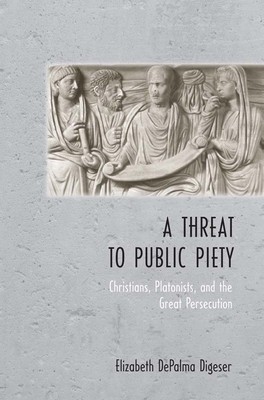
- We will send in 10–14 business days.
- Author: Elizabeth DePalma Digeser
- Publisher: Cornell University Press
- ISBN-10: 0801441811
- ISBN-13: 9780801441813
- Format: 16 x 23.6 x 2.3 cm, hardcover
- Language: English
- SAVE -10% with code: EXTRA
Reviews
Description
In A Threat to Public Piety, Elizabeth DePalma Digeser reexamines the origins of the Great Persecution (AD 303-313), the last eruption of pagan violence against Christians before Constantine enforced the toleration of Christianity within the Empire. Challenging the widely accepted view that the persecution enacted by Emperor Diocletian was largely inevitable, she points out that in the forty years leading up to the Great Persecution Christians lived largely in peace with their fellow Roman citizens. Why, Digeser asks, did pagans and Christians, who had intermingled cordially and productively for decades, become so sharply divided by the turn of the century?
Making use of evidence that has only recently been dated to this period, Digeser shows that a falling out between Neo-Platonist philosophers, specifically Iamblichus and Porphyry, lit the spark that fueled the Great Persecution. In the aftermath of this falling out, a group of influential pagan priests and philosophers began writing and speaking against Christians, urging them to forsake Jesus-worship and to rejoin traditional cults while Porphyry used his access to Diocletian to advocate persecution of Christians on the grounds that they were a source of impurity and impiety within the empire.
The first book to explore in depth the intellectual social milieu of the late third century, A Threat to Public Piety revises our understanding of the period by revealing the extent to which Platonist philosophers (Ammonius, Plotinus, Porphyry, and Iamblichus) and Christian theologians (Origen, Eusebius) came from a common educational tradition, often studying and teaching side by side in heterogeneous groups.
EXTRA 10 % discount with code: EXTRA
The promotion ends in 19d.19:43:49
The discount code is valid when purchasing from 10 €. Discounts do not stack.
- Author: Elizabeth DePalma Digeser
- Publisher: Cornell University Press
- ISBN-10: 0801441811
- ISBN-13: 9780801441813
- Format: 16 x 23.6 x 2.3 cm, hardcover
- Language: English English
In A Threat to Public Piety, Elizabeth DePalma Digeser reexamines the origins of the Great Persecution (AD 303-313), the last eruption of pagan violence against Christians before Constantine enforced the toleration of Christianity within the Empire. Challenging the widely accepted view that the persecution enacted by Emperor Diocletian was largely inevitable, she points out that in the forty years leading up to the Great Persecution Christians lived largely in peace with their fellow Roman citizens. Why, Digeser asks, did pagans and Christians, who had intermingled cordially and productively for decades, become so sharply divided by the turn of the century?
Making use of evidence that has only recently been dated to this period, Digeser shows that a falling out between Neo-Platonist philosophers, specifically Iamblichus and Porphyry, lit the spark that fueled the Great Persecution. In the aftermath of this falling out, a group of influential pagan priests and philosophers began writing and speaking against Christians, urging them to forsake Jesus-worship and to rejoin traditional cults while Porphyry used his access to Diocletian to advocate persecution of Christians on the grounds that they were a source of impurity and impiety within the empire.
The first book to explore in depth the intellectual social milieu of the late third century, A Threat to Public Piety revises our understanding of the period by revealing the extent to which Platonist philosophers (Ammonius, Plotinus, Porphyry, and Iamblichus) and Christian theologians (Origen, Eusebius) came from a common educational tradition, often studying and teaching side by side in heterogeneous groups.


Reviews